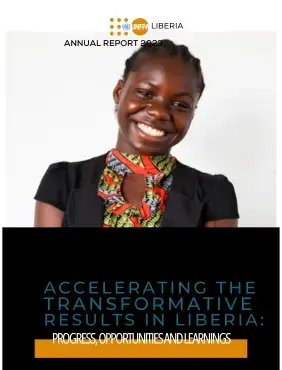In 2023, Liberia achieved another milestone in its democratic governance. The country underwent
peaceful and successful elections that consolidated its democratic progress. Continued peace and political stability in developing countries are important for improving socio-economic and demographic indicators and for creating the necessary conditions for women, girls, men, and boys to exercise their sexual reproductive health and rights.
However, enormous inequalities and challenges persist. Almost a quarter (24 percent) of Liberia's population comprises women of reproductive age (15-49 years).
The stark reality exists that many women and their families are robbed of the joy of motherhood as the deaths of women due to preventable childbirth-related complications and their newborn babies remain one of the highest in the world.
Adolescents between 15-19 years make up 32 percent of the maternal deaths. Many women who survive difficult and prolonged labor often suffer debilitating childbearing injuries, including obstetric fistula. Additionally, an estimated 33 percent of women who want to avoid pregnancy are not using safe and effective family planning methods due to inadequate access to information and services and the existence of stereotypical gender and social norms about women and girls' independent access to contraceptives.
Adolescent girls continue to be disproportionally affected by sexual and gender-based violence and harmful traditional practices. Approximately 85 percent of rape survivors in 2023 were adolescents and very young children. Child marriage, Female Genital Mutilation (FGM), and the pressure from parents for girl children to become breadwinners at an early age continue to affect adolescent girls' development. The rate of teenage pregnancies remains high in Liberia, with 1 in 3 girls between ages 15 to 19 being either a mother or pregnant. The proportion of adolescents and young women who wish to and are using modern contraception (contraceptive prevalence rate) also remains low at 16.4 percent, and the unmet need for family planning among adolescents is high at 47 percent. The legal requirements for parental consent for girls below 16 years to access contraceptives constitute a barrier for adolescents to access SRH information and services independently.
As the United Nations sexual and reproductive health and rights organization, our mission is to deliver a world where every pregnancy is wanted, every childbirth is safe, and every young person reaches their full potential.


